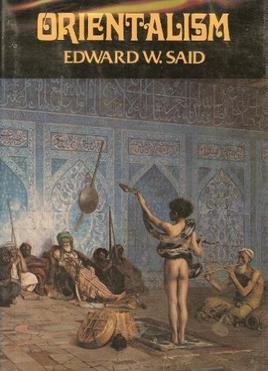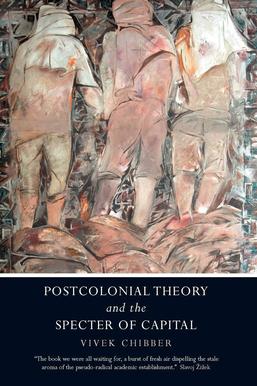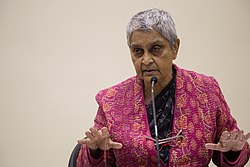
Cultural imperialism comprises the cultural dimensions of imperialism. The word "imperialism" describes practices in which a country engages culture to create and maintain unequal social and economic relationships among social groups. Cultural imperialism often uses wealth, media power and violence to implement the system of cultural hegemony that legitimizes imperialism.

Gayatri Chakravorty Spivak is an Indian scholar, literary theorist, and feminist critic. She is a University Professor at Columbia University and a founding member of the establishment's Institute for Comparative Literature and Society.

In Marxist philosophy, cultural hegemony is the dominance of a culturally diverse society by the ruling class who shape the culture of that society—the beliefs and explanations, perceptions, values, and mores—so that the worldview of the ruling class becomes the accepted cultural norm. As the universal dominant ideology, the ruling-class worldview misrepresents the social, political, and economic status quo as natural, inevitable, and perpetual social conditions that benefit every social class, rather than as artificial social constructs that benefit only the ruling class.
Postcolonial feminism is a form of feminism that developed as a response to feminism focusing solely on the experiences of women in Western cultures and former colonies. Postcolonial feminism seeks to account for the way that racism and the long-lasting political, economic, and cultural effects of colonialism affect non-white, non-Western women in the postcolonial world. Postcolonial feminism originated in the 1980s as a critique of feminist theorists in developed countries pointing out the universalizing tendencies of mainstream feminist ideas and argues that women living in non-Western countries are misrepresented.

Other is a term used to define another person or people as separate from oneself. In phenomenology, the terms the Other and the Constitutive Other distinguish other people from the Self, as a cumulative, constituting factor in the self-image of a person; as acknowledgement of being real; hence, the Other is dissimilar to and the opposite of the Self, of Us, and of the Same. The Constitutive Other is the relation between the personality and the person (body) of a human being; the relation of essential and superficial characteristics of personal identity that corresponds to the relationship between opposite, but correlative, characteristics of the Self, because the difference is inner-difference, within the Self.
The Subaltern Studies Group (SSG) or Subaltern Studies Collective is a group of South Asian scholars interested in the postcolonial and post-imperial societies. The term Subaltern Studies is sometimes also applied more broadly to others who share many of their views and they are often considered to be "exemplary of postcolonial studies" and as one of the most influential movements in the field. Their anti-essentialist approach is one of history from below, focused more on what happens among the masses at the base levels of society than among the elite.
Ranajit Guha emerged as a prominent Indian historian and a seminal figure among the early architects of the Subaltern Studies collective. This methodological approach within South Asian Studies is dedicated to the examination of post-colonial and post-imperial societies, emphasizing an analysis from the vantage point of marginalized social strata. Guha assumed the editorial mantle for numerous foundational anthologies of the group, contributing as an editor prolifically in both English and Bengali.
Strategic essentialism, a major concept in postcolonial theory, was introduced in the 1980s by the Indian literary critic and theorist Gayatri Chakravorty Spivak. It refers to a political tactic in which minority groups, or ethnic groups mobilize on the basis of shared identity attributes to represent themselves.

Orientalism is a 1978 book by Edward W. Said, in which the author establishes the term "Orientalism" as a critical concept to describe the West's commonly contemptuous depiction and portrayal of The East, i.e. the Orient. Societies and peoples of the Orient are those who inhabit the places of Asia, North Africa, and the Middle East. Said argues that Orientalism, in the sense of the Western scholarship about the Eastern World, is inextricably tied to the imperialist societies who produced it, which makes much Orientalist work inherently political and servile to power.
The concept of inversion in postcolonial theory and subaltern studies refers to a discursive strategy which opposes or resists a dominant discourse by turning around its categories and re-enacting an asymmetrical relation with the terms the other way around. The term can be used with positive, negative or neutral value-connotations.
Postcolonialism is the critical academic study of the cultural, political and economic legacy of colonialism and imperialism, focusing on the impact of human control and exploitation of colonized people and their lands. The field started to emerge in the 1960s, as scholars from previously colonized countries began publishing on the lingering effects of colonialism, developing a critical theory analysis of the history, culture, literature, and discourse of imperial power.

Postcolonial international relations is a branch of scholarship that approaches the study of international relations (IR) using the critical lens of postcolonialism. This critique of IR theory suggests that mainstream IR scholarship does not adequately address the impacts of colonialism and imperialism on current day world politics. Despite using the language of post-, scholars of Postcolonial IR argue that the legacies of colonialism are ongoing, and that critiquing International Relations with this lens allows scholars to contextualize global events. By bridging postcolonialism and International Relations, scholars point to the process of globalization as a crucial point in both fields, due to the increases in global interactions and integration. Postcolonial IR focuses on the re-narrativization of global politics to create a balanced transnational understanding of colonial histories, and attempts to tie non-Western sources of thought into political praxis.

The Empire Writes Back: Theory and Practice in Post-Colonial Literatures is a 1989 non-fiction book on postcolonialism, penned by Bill Ashcroft, Gareth Griffiths and Helen Tiffin. The Empire Writes Back was the first major theoretical account of a wide range of postcolonial texts and their relationship with bigger issues of postcolonial culture, and is said to be one of the most significant and important works published in the field of postcolonialism. The writers debate on the relationships within postcolonial works, study the mighty forces acting on words in the postcolonial text, and prove how these texts constitute a radical critique of Eurocentric notions of language and literature. First released in 1989, this book had a second edition published in 2002.
Pradip Basu is an Indian political scientist. He is currently a professor of political science at the Presidency University, Kolkata.

Decoloniality is a school of thought that aims to delink from Eurocentric knowledge hierarchies and ways of being in the world in order to enable other forms of existence on Earth. It critiques the perceived universality of Western knowledge and the superiority of Western culture, including the systems and institutions that reinforce these perceptions. Decolonial perspectives understand colonialism as the basis for the everyday function of capitalist modernity and imperialism.

Decolonising the Mind: the Politics of Language in African Literature, by the Kenyan novelist and post-colonial theorist Ngũgĩ wa Thiong'o, is a collection of essays about language and its constructive role in national culture, history, and identity. The book, which advocates linguistic decolonization, is one of Ngũgĩ's best-known and most-cited non-fiction publications, helping to cement him as a preeminent voice theorizing the "language debate" in post-colonial studies.

Vivek Aslam Chibber is an American academic, social theorist, editor, and professor of sociology at New York University, who has published widely on development, social theory, and politics. Chibber is the author of three books, The Class Matrix: Social Theory after the Cultural Turn, Postcolonial Theory and the Specter of Capital and Locked in Place: State-Building and Late Industrialization in India.

Postcolonial Theory and the Specter of Capital is a 2013 book by the Indian sociologist and New York University professor Vivek Chibber.

Embedded feminism is the attempt of state authorities to legitimize an intervention in a conflict by co-opting feminist discourses and instrumentalizing feminist activists and groups for their own agenda. This term was introduced in the analysis of the US-led invasion of Afghanistan, but can also be applied to several historical examples where women's rights were used as justification and legitimization of Western interventionism.













